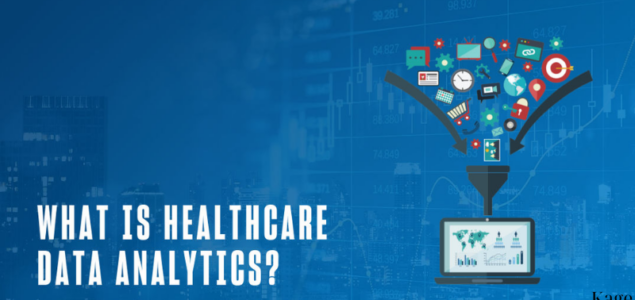In the contemporary landscape of healthcare, the advent of data analytics has emerged as a transformative force, revolutionizing how patient care is delivered, managed, and optimized. With the exponential growth of digital health records, wearable devices, and other health-related technologies, healthcare providers now have access to vast amounts of data. However, the true value lies in the ability to extract meaningful insights from this data to enhance clinical decision-making, improve operational efficiency, and ultimately, enhance patient outcomes. This article delves into the pivotal role of data analytics in healthcare, exploring its applications, benefits, challenges, and future prospects.
The Evolution of Data Analytics in Healthcare

1.1 Historical Context: Tracing the evolution from manual record-keeping to the digitization of health records and the advent of Electronic Health Records (EHRs).
1.2 Technological Catalysts: Examining the role of technological innovations such as cloud computing, IoT devices, and advanced analytics platforms in generating vast amounts of healthcare data.
1.3 Rise of Data-Driven Healthcare: Exploring how data analytics has become indispensable for extracting actionable insights from the deluge of healthcare data, facilitating evidence-based decision-making and personalized patient care.
Applications of Data Analytics in Healthcare

2.1 Clinical Decision Support Systems (CDSS): Delving into the integration of data analytics into CDSS to aid healthcare professionals in diagnosing diseases, selecting treatments, and predicting patient outcomes.
2.2 Predictive Analytics: Unveiling the potential of predictive modeling to forecast disease progression, identify high-risk patients, and optimize preventive interventions, thereby reducing hospital readmissions and healthcare costs.
2.3 Population Health Management: Investigating how data analytics enables healthcare organizations to stratify populations based on health risks, design targeted interventions, and enhance preventive care initiatives.
2.4 Personalized Medicine: Illustrating how data analytics facilitates the customization of treatment plans based on patient-specific characteristics, genetic profiles, and real-time monitoring data, thereby optimizing therapeutic outcomes.
2.5 Operational Analytics: Examining the application of analytics in optimizing hospital workflows, resource allocation, and inventory management, leading to enhanced operational efficiency and cost savings.
Benefits of Data Analytics in Healthcare
3.1 Enhanced Clinical Outcomes: Highlighting how data-driven insights empower healthcare providers to deliver timely interventions, mitigate adverse events, and improve patient outcomes across diverse clinical settings.

3.2 Informed Decision-Making: Emphasizing the role of analytics in providing clinicians with real-time access to comprehensive patient data, enabling them to make informed decisions and tailor treatments to individual needs.
3.3 Cost Containment: Discussing how analytics-driven approaches help in identifying inefficiencies, reducing unnecessary medical procedures, and optimizing resource utilization, thereby mitigating healthcare costs without compromising quality of care.
3.4 Patient Engagement and Empowerment: Exploring how data analytics fosters patient engagement through personalized health insights, remote monitoring solutions, and self-management tools, empowering individuals to take proactive control of their health.
3.5 Research Advancements: Highlighting the contribution of data analytics to accelerating medical research, facilitating clinical trials, and unlocking new avenues for drug discovery and treatment innovation.
Challenges and Considerations
4.1 Data Quality and Interoperability: Addressing challenges related to data accuracy, completeness, and interoperability across disparate healthcare systems, necessitating standardized protocols and robust data governance frameworks.
4.2 Privacy and Security: Discussing the importance of safeguarding patient privacy and ensuring compliance with regulatory mandates such as HIPAA, while leveraging encryption, access controls, and audit trails to mitigate security risks.
4.3 Regulatory Compliance: Examining the complex regulatory landscape governing data usage, sharing, and storage in healthcare, and the need for organizations to navigate compliance requirements while leveraging data analytics effectively.
4.4 Workforce Skills Gap: Recognizing the shortage of skilled professionals proficient in both healthcare domain knowledge and data analytics expertise, and the imperative to invest in workforce development and training initiatives.
4.5 Ethical Considerations: Addressing ethical dilemmas associated with data analytics, including concerns regarding patient consent, data bias, and the responsible use of predictive algorithms in clinical decision-making.
Conclusion:
In conclusion, data analytics holds immense promise for transforming the landscape of healthcare delivery, management, and innovation. By harnessing the power of data-driven insights, healthcare providers can optimize clinical workflows, enhance patient outcomes, and drive operational excellence. However, realizing the full potential of data analytics in healthcare necessitates addressing various challenges, including data quality, privacy concerns, and talent shortages. Looking ahead, continued advancements in technology, coupled with collaborative efforts across the healthcare ecosystem, are poised to unlock new frontiers in data-driven healthcare innovation, ultimately ushering in an era of personalized, proactive, and patient-centric care.
